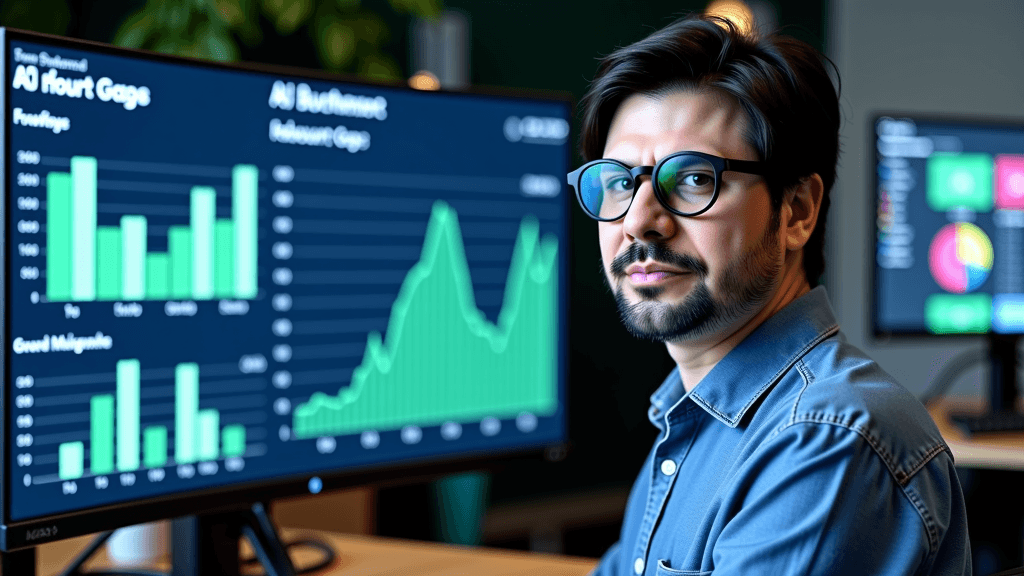AI Radar: From Google's Mass Training to False Memories – The Brazilian Panorama in 24h
May 3, 2025 | by Matos AI

What has happened in the last 24 hours in the world of artificial intelligence shows that Brazil is undergoing a digital transformation. From massive training initiatives to ethical debates on cognitive manipulation, we are living through a decisive moment in our relationship with intelligent technologies. The most important question is no longer if AI will transform our daily lives, but as we will position ourselves in the face of these changes.
Google announces AI training for 1 million Brazilians
The most impactful news of the last few hours comes from Google, which announced during Web Summit Rio a commitment to train 1 million Brazilians in artificial intelligence and cloud computing. The initiative, presented by Patricia Florissi, technical director of Google Cloud, will make free courses available in Portuguese, directly attacking one of the biggest bottlenecks in our market: talent training.
This move could not be more timely. In my work with innovation ecosystems across Brazil, I have observed that the demand for qualified AI professionals is growing exponentially, with salaries already exceeding R$20,000 per month for specialists. The shortage of talent is, today, the main limiting factor for the adoption of AI on a large scale in Brazilian companies.
Join my WhatsApp groups! Daily updates with the most relevant news in the AI world and a vibrant community!
- AI for Business: focused on business and strategy.
- AI Builders: with a more technical and hands-on approach.
Second data shared by Google, the Cloud Skills Boost platform already has 648 courses in Portuguese, 49 of which are focused on generative AI. This represents a significant step towards democratizing access to knowledge, something I have advocated since the beginning of my journey in the innovation ecosystem.
The perceived difficulty barrier mentioned by Florissi is something I also see in my mentoring. Many talented professionals are hesitant to enter the AI field because they believe they need advanced knowledge in mathematics or programming. We need to demystify this field and show that there are different levels of expertise possible.
AI in healthcare: between ambitious promises and the reality of challenges
Another news story that caught attention was the interview with Nobel Prize winner in Chemistry Demis Hassabis, who suggested that AI could dramatically accelerate drug development and potentially cure all diseases within the next decade.
This prediction, while inspiring, needs to be taken with a grain of salt. As experts interviewed by DW pointed out, there are significant limitations to this scenario, including the complexity of the diseases and the lengthy clinical testing processes required to ensure drug safety.
In my analysis of healthcare innovation, I always emphasize that AI is already having real impacts on diagnostics and treatment optimization. However, the vision of mass cures within a decade seems overly optimistic. Technology is a powerful tool, but it is not a magic wand.
What we can more realistically expect is a significant acceleration in specific areas of medicine, especially those where there is already a large volume of structured data. AI will become an indispensable assistant to doctors, but it will not replace human judgment and the complexity of personalized care.
The Dark Side: AI, False Memories, and Cognitive Manipulation
One of the most disturbing aspects of the evolution of AI is its ability to distort our very perception of reality. An analysis published by UOL highlights how AI systems can manufacture false memories and rewrite our personal histories.
Second studies conducted by the MIT Media Lab, exposure to AI-altered content significantly increases the formation of false memories. This has profound implications not only for individuals, but for society as a whole.
At a time when the boundary between the real and the artificial is becoming increasingly blurred, we need to develop both technological tools and cognitive skills to navigate this environment. Digital literacy must include not only the use of technologies, but the critical ability to evaluate their authenticity.
In the lectures I give on the future of work, I always emphasize that the most valuable skills in the AI era include critical thinking, discernment and the ability to verify information. Paradoxically, the more technology advances, the more we need to reinforce fundamentally human aspects of cognition.
Press Freedom in the Age of AI
It is no coincidence that UNESCO chose the influence of AI on the media as the central theme of World Press Freedom Day, celebrated on May 3. The event organized by the entity in Brussels will discuss how technology transforms journalism, bringing both opportunities and threats.
According to information released by GZH, AI has the potential to improve investigative journalism, content creation, and fact-checking. However, it also brings risks such as AI-generated misinformation, deepfake technology, biased moderation, and threats to journalists’ privacy.
This debate reflects a dynamic I see in virtually every industry impacted by AI: the same tool that can democratize access to information can also be used to manipulate it on an unprecedented scale.
In my experience working with open innovation initiatives, I have argued that we need to develop not only the technologies, but the ethical and regulatory frameworks that ensure their responsible use. Technology advances much faster than our ability to establish guidelines for its proper use.
Inappropriate use of AI in the Brazilian judiciary
A case that perfectly exemplifies the risks of irresponsible use of technology came to light with the investigation by the General Inspectorate of Justice of Maranhão into a judge who allegedly used AI to “inflate” his number of monthly sentences.
Second preliminary investigation, magistrate Tonny Carvalho Araújo Luz saw his monthly average of sentences jump from 80 to 969 in just one month, a 12-fold increase that raised suspicions of inappropriate use of technology.
This case illustrates a phenomenon that I have observed in several organizations: the adoption of AI without proper governance and ethics protocols. In my consulting work, I always emphasize that the implementation of artificial intelligence must be accompanied by clear guidelines on transparency, accountability, and human oversight.
The justice system, by its nature, requires decisions that reflect not just the mechanical application of the law, but also nuances of interpretation, social contexts, and ethical considerations that are still beyond the capabilities of current AIs. Delegating critical decisions to algorithms without adequate oversight is not only a technically questionable shortcut, but potentially dangerous for society.
Google launches AI Mode in search engine
Returning to more promising news, Google announced that it has started making AI Mode available on its search engine for some users in the United States. The tool improves search engine responses by providing deeper insights into complex topics.
According to information from CNN Brazil, users will see visual cards that, when clicked, offer more details about places of interest and products. The system also maintains search history, allowing you to revisit previous conversations and ask follow-up questions.
This search engine evolution represents a broader trend that I have been following closely: the transition from traditional search interfaces to more natural conversational experiences. The impact for Brazilian businesses will be significant, especially in terms of SEO and digital marketing strategies.
Companies that quickly adapt to this new search paradigm will gain significant competitive advantages. In my mentoring sessions with startups, I have emphasized the importance of understanding how AI algorithms interpret and prioritize content, a skill that will become increasingly valuable.
AI and psychological violence against women
An important advance in Brazilian legislation was the approval of Law 15,123/2025, which increases the penalty for cases of psychological violence against women by 50% when committed with the use of artificial intelligence.
According to analysis published by Consultor Jurídico, the law recognizes the amplified potential for harm that technologies like deepfakes can cause, leading to public humiliation and severe psychological trauma.
This legislation represents an important recognition that emerging technologies can create new forms of violence and abuse that require specific responses. In my talks on diversity and innovation, I often discuss how technology can both empower marginalized groups and create new forms of discrimination and violence.
Brazil takes an important step by recognizing this reality and adapting its legal framework to protect victims of AI-facilitated abuse. We need more initiatives like this, which balance encouraging innovation with protecting fundamental rights.
AI in everyday life: from household appliances to digital security
Completing our overview, two news items show how AI is becoming increasingly integrated into our daily lives: the transformation of home appliances and the integration of biometrics, cloud and AI into security systems.
Second InfoMoney analysis, AI is no longer a distant promise but has become part of the daily lives of millions of Brazilians, bringing more practicality, efficiency and personalization through smart home appliances.
At the same time, Terra report highlights how the combination of biometrics, cloud computing and AI is creating a new generation of digital security solutions in response to the rapid growth of cyber threats.
These trends reinforce something I’ve been arguing for years: AI is not a standalone technology, but a component that integrates with virtually every aspect of our digital and physical infrastructure. The real value comes when artificial intelligence combines with other technologies and adapts to the specific context of each application.
What does this mean for Brazil?
Analyzing all of this news, I see a scenario of opportunities and challenges for Brazil in the field of artificial intelligence:
- Mass training opportunity: Google’s initiative represents an important step toward closing our AI talent gap, but we need more similar programs from both the private sector and public policy.
- Need for governance and ethics: The cases of inappropriate use of technology and the risks identified reinforce the importance of developing balanced regulatory frameworks that promote responsible innovation.
- Specific sectors undergoing transformation: Health, justice, media and security are among the sectors that will see the most profound transformations, requiring rapid adaptation from professionals and organizations.
- Consumer increasingly connected: Integrating AI into everyday products accelerates adoption and familiarity with the technology, creating a consumer market more receptive to innovation.
Next steps for companies and professionals
Given this scenario, what practical recommendations can I offer?
- For professionals: Take advantage of initiatives like Google’s to develop AI skills, even if you don’t intend to become an expert. Understanding the fundamentals will be valuable in almost any career.
- For companies: Develop clear protocols for AI adoption that include ethical considerations, transparency, and adequate human oversight. Experiment on a small scale before implementing more widely.
- For entrepreneurs: There are huge opportunities in developing solutions that help mitigate the identified risks, such as authenticity verification tools, deepfake detection, and protection against AI-facilitated abuse.
In my mentoring work with startups and established companies, I have observed that the greatest successes do not necessarily come from those who develop the most advanced AI, but from those who are able to apply it ethically and responsibly to solve real problems in society.
Conclusion: between enthusiasm and caution
The past 24 hours in the AI space reinforce a conviction I have consistently held: we need to navigate between enthusiasm for the transformative possibilities of technology and caution about its risks and limitations.
The good news is that Brazil seems to be waking up to this reality. I see training initiatives, legislative developments and public debates that indicate a growing maturity in our relationship with artificial intelligence.
If we can maintain this balance—promoting innovation while protecting core values—we can not only adapt to the AI revolution, but also help shape it in ways that reflect our priorities and values as a society.
In my mentoring and consulting services, I help companies and professionals find this balance, developing AI adoption strategies that maximize value and minimize risk. If this is a challenge your organization faces, I invite you to learn about my programs and services specialized in responsible innovation.
The future of AI in Brazil is being written now, and we all have the opportunity to contribute to this story.
✨Did you like it? You can sign up to receive 10K Digital's newsletters in your email, curated by me, with the best content about AI and business.
➡️ Join the 10K Community here
RELATED POSTS
View all



